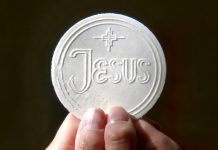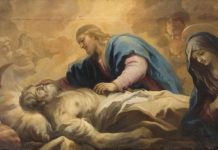Sounds crazy? You might have heard of the Art of Living, a package claiming to be designed for happy living, but never about the Art of Dying. Before introducing the Art of Dying to you, I should make one thing clear. The Art of Living is not for Christians to follow. Unfortunately many Christians have fallen prey to this package. We call them unfortunate because they lost their way to the Risen Lord who only can guarantee them peace and joy. It is a terrible mistake to forsake the fountain of living water and go to cracked cisterns without water. Jeremiah laments; ‘For my people have committed two evils: they have forsaken me, the fountain of living water, and dug out cisterns for themselves, cracked cisterns that can hold no water’ (Jer. 2:13)
We, Christians do not need anything of that sort, because we live by the fountain of living water. We live through Christ, with Christ and in Christ who is the sole assurance of a happy life in this world and beyond. A happy life never comes through certain postures or breathing exercises. It is possible only by the grace of God. We call it the kingdom of God. “For the kingdom of God is not food and drink but righteousness and peace and joy in the Holy Spirit’ (Rom. 14:17). This is the only real thing. Everything else is just vanity.
We do not have to be concerned much about life, because we are taught how to live our life in the christian way. If christian life is a celebration in Christ, christian death should be a celebration of faith. Unfortunately, something prevents us from making our death a celebration in Christ. Here the real issue is our ignorance about what is going to happen after death. This fear of the unknown takes us to higher levels of anxiety and worry.
Everyday, we see death around us. In times of war and pandemics the sheer number of deaths trouble our mind greatly. Death can occur at any time. As the old saying goes, death is an uninvited guest. If there is a chance of some guests dropping in quite unexpectedly, how would we prepare for it? We will make sure that we have everything at home to receive a guest at any time. A clean house, some toiletries, and reasonably good food will satisfy the guest. An unexpected guest is not a cause of celebration, you might argue. Then why not manage the situation with a little extra effort?
Art of Dying is all about the ways of managing the unexpected guest called death. It is about making every death a celebration in Christ, an occasion of joy, a testimony of peace and an assurance of hope.
If fear of death is the fear of the unknown, then we should try to know death from the true perspective. Death is not a full stop, not even a comma, but just another point in the continuum called life. Remember the last words of our Saviour; “Father, into your hands I commend my spirit” (Luke 23:46). To make our death a celebration, we should also be able to say the same words at the hour of our death. Do not be sceptical whether this is possible for us. Our trust is in a God for whom everything is possible.
Anybody who receives the true Body and Blood of Jesus Christ is promised eternal life. For them death means the point where they stop receiving the Lord in Eucharist and start seeing him face to face. It is when we lose this hope of an eternal life that fear starts to grip us. Never think of our God as someone who instills fear in us, every day, every time. He is a God who tells us ‘Do not fear’ not once, but 366 times in the Bible. Well, you got it. But some might ask, why this 366 and not 365? Why should the God give us this promise for an extra day?
I was also not sure about the reason for this one extra day. Somehow, I guessed that it would be for the leap year. And my guess proved correct when, after many years, I read about Richard Wumbrand, the Romanian Christian who was tortured in a communist prison for fourteen years for confessing his christian faith. When he was kidnapped by the police in 1944, he was smiling, and when the officers asked him why he was smiling, he replied that he had a promise from his Master; ‘Do not fear’. He says that he realised the purpose of the promise for an extra day on the day he was arrested. Because it was on 29th of February in a leap year!
Why should we fear? God guarantees us freedom from fear for all the days of the year, taking special care to protect those who need it in the rarest of rare occasions too! When Wumbrand was dragged into a police vehicle and then taken to the prison from where a return was only a dream, when he came face to face with the prospects of being thrown into prison, he had no idea about what was awaiting him. But he found solace in the Lord’s promise, that we should not fear. If our fear of death is the fear of the unknown, turn to Jesus and his promise. Our fear will vanish in no time.
In fact more than the fear of facing the unknown what troubles us it the fear of losing the known. In simple terms we call it attachment to this world. One who is too much involved in the affairs of this world, who derives pleasure from worldly things, amasses wealth and lives by the philosophy of hedonism, will naturally fear the moment of death. If your hope is in this world and this world alone, what do you have to look forward to at the hour of your death? St Paul describes those people whose hope in Christ is only for this life as the most unfortunate. ‘If for this life only we have hoped in Christ, we are of all people most to be pitied’ (1 Cori. 15:19).
It is sad that nowadays many Christians approach the door of death without any hope in Christ. It is our collective failure that our brothers and sisters are made to leave this world without any hope in the eternal life promised by Christ. If you are a baptised Christian, a peaceful death with steadfast hope in Christ is your birthright. It is not something to be exchanged for a few loaves of bread and a cup of lentil stew – the pleasures of this world – as Esau did. ‘So he swore to him (Jacob), and sold his birthright to Jacob. Then Jacob gave Esau bread and lentil stew, and he ate and drank, and rose and went his way. Thus Esau despised his birthright’ (Gen. 25:33-34).
We started with the subject,’ the Art of Dying’. It is nothing but dying in Christ. It is the natural culmination of a life in Christ. We will find many around us who are not prepared for their death. We should fear that their numbers are far more than who have done at least some preparations for their death.
Unlike Art of Living, the Art of Dying does not contain difficult physical postures or breathing exercises. It is rather simple. Be in a state of Grace at all times. Sacraments, especially those of Confession and Holy Communion, will help us in our attempt to be in a state of perfect Grace. And when the hour of death approaches, request for the ‘anointing of the sick’ from a priest. It will help us a lot in our final moments, when the devil will try with all his power to distract our minds. It can so happen that even those who were good Christians tend to stray away from faith in their final moments. Please understand that it is the handiwork of devil. Sometimes they might refuse to receive the anointing of the sick. In their stubbornness before the parting moments, they might exhibit symptoms of rejecting Christ. They are afraid of leaving what all they had amassed in this world. When the moment of reckoning comes, they realise their folly and lament about the futility of their life.
We should expect that the final assault of the devil will be severe. As such, preparation is a must to endure this attack which manifests itself through five temptations. They are
1. The temptation to apostasy. We should pray for the virtue of faith and reaffirm our baptismal Faith
2. The temptation to despair over sins. We should pray for the virtue of hope in God’s forgiveness
3. The temptation to anger and crossness at others. We should pray for the virtue of charity that will help us to be patient
4. The temptation to prideful self-reliance. We should pray for humility and total dependence on God
5. The temptation to cling to this life. We should pray for detachment and abandonment to God’s will
At the moment of temptation always pray, “My Jesus, mercy! Mary, help!”
As for the living, it is their duty to pray for the dying. It should be our mission to see that none of our dear ones leave this world without reconciling themselves with God. Jesus has revealed through St Foustina that prayer for divine mercy is a sure way to help the dying.
‘O merciful Jesus, stretched on the cross, be mindful of the hour of our death. O
most merciful Heart of Jesus, opened with a lance, shelter me at the last moment of
my life. O Blood and Water, which gushed forth from the Heart of Jesus as a fount of
unfathomable mercy for me at the hour of my death, O dying Jesus, Hostage of
mercy, avert the Divine wrath at the hour of my death’ ( Diary No 813).
From the experience of millions of Christians – it is my personal experience as well – I can assure you that praying the Divine Mercy Chaplet for the dying always helps him/her for a safe passage from this world to eternity. I have heard of many people getting a happy death after somebody prayed the Divine Mercy Chaplet for them. St Foustina writes:
‘When I entered my solitude, I heard these words: At the hour of their death, I defend
as My own glory every soul that will say this chaplet; or when others say it for a
dying person, the indulgence is the same. When this chaplet is said by the
bedside of a dying person, God’s anger is placated, unfathomable mercy envelops
the soul, and the very depths of My tender mercy are moved for the sake of the
sorrowful Passion of My Son’ (Diary No 811).
If we truly love others, we are bound to pray for them. Remember that praying for the living and the dead is a work of mercy. We should persuade the dying for receiving the anointing of the sick. It is rightly called Viaticum (food for the journey) without which the journey to eternity would be difficult.
‘The angel of the God came a second time, touched him ( Elijah), and said, “Get up and eat, otherwise the journey will be too much for you”. He got up, and ate and drank; then he went in the strength of that food forty days and forty nights to Horeb the mount of God’ (1 Kings 19:7:8). Elijah could not have completed the arduous journey to the mount of God by his own. It was the heavenly bread delivered through an angel from heaven that helped him reach the mount of God safely. We know that the ‘cake baked on hot stones’ which sustained Elijah till he reached the presence of God was the precursor of the bread of life which we receive in Holy Eucharist.
We need to look at death through the eyes of faith and not through the lens of this world. St Padre Pio’s prayer will help us for this, sufficiently before the shades grow long and dusk falls.
‘It is getting late and death approaches, I fear the darkness, the temptations, the dryness, the cross, the sorrows. O how I need You, my Jesus, in this night of exile! Stay with me Lord, because at the hour of my death, I want to remain united to you, if not by Communion, at least by grace and love’.
St Francis of Assissi calls death his sister. St Paul tells that he preferred to die rather than continuing in the body. St Therese of Lisieux was happy to die because she treated this life as a means to enter a blissful eternity. She said; “The world is thy ship and not thy home”. Be wise to call a ship a ship. It is not our home. Our home is somewhere else. Even our citizenship is in another kingdom to which we eagerly look forward.
Death is the occasion to change our citizenship. We have to decide it right now. If you are confused, as usual, call our mother.
“Holy Mary, mother of God, pray for us sinners, now and at the hour of our death, Amen! Let us seek the help of the Holy Family also by praying; ‘Jesus, Mary, and Joseph, assist me in my last agony’.
In the unfortunate event of you being left alone at the time of death, with nobody to help you, place all your trust in Jesus and look at a Crucifix, or bring one to mind in your imagination, and adore your redeemer. Recollect His passion which He endured for your sins. Meditate on the compassion of your Savior towards you as a sinner. Imagine Jesus on the Cross with his arms extended, his head bowed, embracing and supporting you, helping you face your sins.
Then undertake a general examination of your conscience, asking the Holy Spirit to uncover the sins of your life. Ask for the grace of honest repentance, not making excuses or rationalizations of sinful actions, trusting solely in the redemptive sufferings of Christ. If you are aware of any mortal or serious sins, ask for the grace to make an act of perfect contrition followed by this prayer: ‘Lord, have mercy on me a sinner’ or ‘ Jesus, Son of David, have mercy on me a sinner’.
Pray for the assistance of your guardian angel and the communion of saints, especially those saints who were once sinners; St. Peter, St. Mary Magdalene, St. Dismas (the Good Thief) and St. Paul. Unable to receive Viaticum, make a spiritual communion by ardently longing to receive Holy Communion. At the moment of death, pray aloud or in your heart, “Jesus, Jesus, Jesus” or “Jesus, Mary and Joseph, I give you my heart and my soul.”
May Jesus Christ who suffered for us bless all of us with a happy death so that we may live with him forever.

















